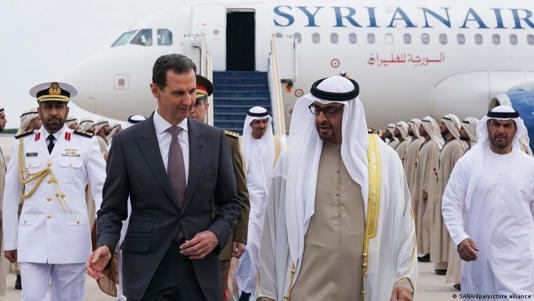
-
Published: 19 March 2023

President Bashar al-Assad of Syria paid an official visit to the UAE, for the first time in more than ten years
Edited by |ALexander Yaxinia
Politics Section - CJ Journalist
03/19/2023 - 10:37:07 PM
On an official visit, Syrian President Bashar al-Assad arrived in the UAE at a time when more Arab countries have indicated their willingness to ease Damascus' isolation. The visit to the UAE is his second in two years, after a visit to the Sultanate of Oman last month.
Today, Sunday (March 19, 2023), Syrian President Bashar al-Assad arrived in the UAE on an official visit, during which he is accompanied by his wife, Asma al-Assad. According to the Emirates News Agency (WAM), Sheikh Mohammed bin Zayed Al Nahyan, President of the Emirates, was at the forefront of Al-Assad's reception upon his arrival at the presidential airport in Abu Dhabi.
Upon entering the airspace of the UAE, the Syrian President's plane was accompanied by warplanes, welcoming his visit. The Syrian President was given an official reception ceremony upon the arrival of his convoy to Qasr Al Watan in Abu Dhabi. Al-Assad is accompanied by a delegation that includes the ministers of economy, foreign trade, presidential affairs, and information.
Syrian President Bashar al-Assad held talks in the UAE, on his second visit to the Gulf since the earthquake last month, amid efforts to restore Damascus' relations with countries in the region. The visit to the UAE was his second in two years, after a trip to the Sultanate of Oman last month. These are the only two Arab countries that Assad has visited since the beginning of the Syrian conflict in 2011.
Emirati President Sheikh Mohammed bin Zayed Al Nahyan wrote on Twitter;
"I welcome President Bashar al-Assad to the Emirates. We held positive and constructive discussions to support and develop brotherly relations."
Abu Dhabi, which restored its relations with the Assad government in 2018, led relief efforts in the aftermath of the February 6 earthquake that struck southeastern Turkey and northern Syria, killing tens of thousands. Analysts say the diplomatic momentum generated in the aftermath of the earthquake could boost Damascus' relations with countries in the region that have hitherto resisted mending ties after more than a decade of war.
The Emirati diplomatic advisor, Anwar Gargash, wrote on Twitter, "The UAE's position is clear regarding the need for Syria to return to its surroundings by activating the Arab role, and this was confirmed by His Highness Sheikh Mohammed bin Zayed during his meeting today with President Bashar al-Assad."
He continued, "Enough of more than a decade of war, violence and destruction, and the time has come to enhance cooperation and solidarity of our Arab countries to ensure stability and prosperity in the region." He stressed, "The UAE's approach and efforts towards brotherly Syria are part of a deeper vision and a broader approach aimed at strengthening Arab and regional stability and overcoming difficult years of confrontation. The events associated with the decade of chaos and their repercussions have proven that our Arab world is more important than addressing its issues and crises, away from regional and international interference."

Saudi Arabia and Qatar, as well as the UAE, to a lesser extent, supported Syrian armed opposition groups that sought to overthrow Assad. But Abu Dhabi has rebuilt relations with Damascus in the past years, despite the objections of the United States, at a time when it seeks to confront the influence of Iran, which, like Russia, stands on the side of Assad in the Syrian conflict. Both countries helped Assad tip the war in his favour.
Saudi Arabia, which recently concluded an agreement with Iran to restore bilateral relations, has opened the door to a possible dialogue with Damascus, especially on humanitarian issues, saying that Arab consensus is growing that isolating Syria is not feasible.
Qatar, like Washington, has expressed its opposition to any moves toward restoring or normalizing relations with Assad, attributing this to his government's brutality during the conflict and the need to make progress first toward a political solution. Hundreds of thousands of people have died in the Syrian conflict, which raged after an uprising against Assad drew in many foreign powers and divided the country.
A.S./A.G. (DPA, AFP, Reuters)
